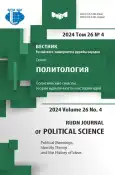The State’s Strategy to Strengthen the Russian Macropolitical Identity in the Digital Space: Dynamics and Prospects
- Authors: Iokhim A.N.1
-
Affiliations:
- RUDN University
- Issue: Vol 26, No 4 (2024): Political Meanings, Identity Theory and the History of Ideas
- Pages: 819-839
- Section: IDENTITY AND SOCIO-POLITICAL DIVISIONS
- URL: https://journal-vniispk.ru/2313-1438/article/view/322410
- DOI: https://doi.org/10.22363/2313-1438-2024-26-4-819-839
- EDN: https://elibrary.ru/JFHGYG
- ID: 322410
Cite item
Full Text
Abstract
Identifying the dynamics and prospects of the state’s communication strategy in the digital space, aimed at strengthening and increasing the stability of the Russian macropolitical identity is in the focus of major research project and this study as it’s part. To achieve this goal, the study identifies threats and risks to the sustainability of macropolitical identity in the digital space, due to both the very specifics of the functioning of the digital environment and the actual realities of the global information and cognitive confrontation in which the Russian state is today. The dynamics of the transformation of the structure of digital communications and digital media consumption of Russians in the last two years, as well as the role and place occupied by the problem of macropolitical identity in this structure is to be discussed. The promising approaches to building an effective strategy of the state to ensure the sustainability of the Russian macropolitical identity are offered.
About the authors
Andrey N. Iokhim
RUDN University
Author for correspondence.
Email: iokhim_annk@pfur.ru
ORCID iD: 0000-0001-8125-6363
Candidate of Political Sciences, Associate Professor of the Department of Comparative Political Science, Faculty of Humanities and Social Sciences
Moscow, Russian FederationReferences
- Bagdasaryan, V.E. (2022). The concept of the state-civilization: problems of methodology and political implementation. Central Russian Journal of Social Sciences, 6, 15–29. (In Russian).
- Bespalova, T.V. (2020). The future of Russian civilization: some ideological contours. Issues of social theory, 12, 131–142. (In Russian). http://doi.org/10.30936/2227-7951-2020-12-131-142.
- Blackburn, M. (2021). Mainstream Russian Nationalism and the “State-Civilization” Identity: Perspectives from Below. Nationalities Papers, 49(1). 89–107. http://doi.org/10.1017/nps.2020.8.
- Fedorchenko, S.N. (2021). Formation of new identities in the post-Soviet space: Between the real and digital world. Journal of Political Studies, 3, 3–15. (In Russian). http://doi.org/10.12737/2587-6295-2021-5-3-3-15.
- Fedorchenko, S.N. (2023). State-civilization in the digital Ecumene. Journal of Political Studies, 1, 3–26. (In Russian). http://doi.org/10.12737/2587-6295-2023-7-1-3-26.
- Goode, J.P. (2018). Everyday patriotism and ethnicity in today’s Russia. In P. Kolstø & H. Blakkisrud (Eds.), Russia before and after Crimea: Nationalism and Identity (pp. 258–281). Edinburgh: Edinburgh University Press.
- Iokhim, A.N. (2023). Russian identity in the context of global digitalization: on the issue of digital sovereignty. Lomonosov Political Science Journal, 6, 58–80. (In Russian). http://doi.org/10.55959/MSU 0868-4871-12-2023-1-6-58-80.
- Iokhim, A.N., & Laguzova, M.A. (2023). «How to equip Russia»: The problem of social harmony in the discourse of post-Soviet identity. RUDN Journal of Political Science, 1, 77–96. (In Russian). http://doi.org/10.22363/2313-1438-2023-25-1-77-96.
- Kerimov, O.Y. (2023). The concept of the State-civilization as the theoretical basis of the model of Russian political modernization. Issues of national and federal relations, 6(99), 2487–2497. (In Russian). http://doi.org/10.35775/PSI.2023.99.6.012.
- Kratochvíl, P., & Shakhanova, G. (2020). The patriotic turn and re-building Russia’s historical memory: Resisting the West, leading the Post-Soviet East? Problems of Post-Communism, 68(5), 1–13. http://doi.org/10.1080/10758216.2020.1757467.
- Laclau, E., & Mouffe, C. (1985). Hegemony and Socialistic Strategy. Towards a Radical Democratic Politics. London: Verso.
- Levashov, V.K., & Grebenyuk, O.V. (2022). Actual changes in social networks and the digital environment during the Special military operation in Ukraine. Social and humanitarian knowledge, 2, 204–213. (In Russian). http://doi.org/10.18255/2412-6519-2022-2-204-213.
- Lewan, M. (2020). The future of the nation-state: How the nation-state can find a way through digitalization. In A. Larsson & R. Teigland (Eds.), Digital transformation and public services: Societal impacts in sweden and beyond (pp. 293–318). London, N.Y.: Routledge.
- Lukina, K.V., Shirokova, A.S., & Zakharycheva, T.A. (2022). Sociological measurement of user reaction to Instagram blocking: expert assessment. Power and management in the East of Russia, (3), 132–141. (In Russian). http://doi.org/10.22394/1818-4049-2022-100-3-132-141.
- Malinova, O.Y. (2010). Constructing a macropolitical identity in post-Soviet Russia. Political expertise: POLITEX, 1, 5–28. (In Russian).
- Martianov, D.S. (2022). Transformation of the virtual public sphere in the conditions of a special military operation. South-Russian Journal of Social Sciences, 23(3), 20–32. (In Russian). http://doi.org/10.31429/26190567-23-3-20-32.
- Martynenko, T.S., & Dobrinskaya, D.E. (2021). Social inequality in the era of artificial intelligence: from digital to algorithmic gap. Monitoring of public opinion: Economic and social changes, 1, 171–192. (In Russian). http://doi.org/10.14515/monitoring.2021.1.1807.
- Mouffe, C. (2018). For a Left Populism. London; N.Y.: Verso.
- Mjør, K.J., & Turoma, S., (Eds.). (2020). Russia as Civilization: Ideological Discourses in Politics, Media and Academia. London, N.Y.: Routledge.
- Shchekoturov, A.V., & Zinich, A.V. (2022). Media sources of information in the context of blocking social networks (materials of a survey of students of BFU and OMGAU). Information Society, 5, 56–64. (In Russian). http://doi.org/10.52605/16059921_2023_05_56.
- Titov, V.V. (2020). Simulative reality as a challenge to national identity: theory and Russian political practices. RUDN Journal of Political Science, 22(4), 590–602. (In Russian). http://doi.org/10.22363/2313-1438-2020-22-4-590-602.
- Tsygankov, A., & Tsygankov, P. (2022). Imaging Russia as a state-civilization: ethnocultural and geoeconomic dimensions. In A. Pickel (Ed.), Handbook of Economic Nationalism (pp. 315–327). Cheltenham: Edward Elgar Publishing.
- Van Dijk, T. (2022). Ideology in cognition and discourse. In S.K. Määttä, & M.K. Hall (Eds.), Mapping Ideology in Discourse Studies (pp. 137–157). Berlin: De Gruyter Mouton.
- Van Dijk, T. (2023). Analyzing frame analysis: A critical review of framing studies in social movement research. Discourse Studies, 25(2), 153–178. http://doi.org/10.1177/14614456231155080.
Supplementary files









